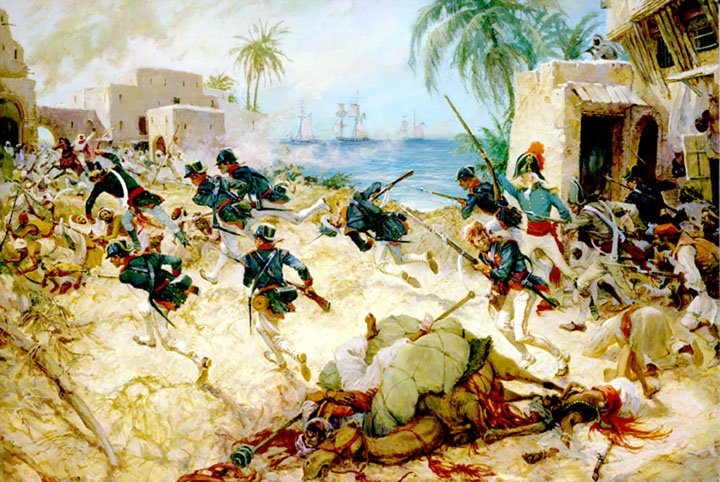The Battle of Tripoli: A Blend of American Marines and European Mercenaries
The Battle of Tripoli, also known as the Battle of Derna, stands as a remarkable chapter in the history of the United States Marines and the early years of the nation. This conflict, which unfolded in 1805 during the First Barbary War, was a pivotal moment that marked the first time the United States engaged in a land battle on foreign soil. However, what makes this battle truly intriguing is the diverse composition of the Marine force that fought in it.
At the heart of the Battle of Tripoli was a small group of U.S. Marines, led by First Lieutenant Presley O’Bannon. They played a pivotal role in the engagement, alongside Arab and Berber mercenaries. Their bravery and determination would go on to be immortalized in the opening line of the Marine Corps Hymn, “From the Halls of Montezuma to the Shores of Tripoli.”
The composition of the Marine force that participated in the Battle of Tripoli was indeed remarkable in its diversity and reflected the complex geopolitical landscape of the early 19th century. Among the ranks of these Marines were a significant number of European mercenaries, drawn from various corners of the continent. Notably, some had previously served as soldiers in the French Foreign Legion, a renowned fighting force known for its adaptability and resilience.
These European mercenaries brought a wealth of military experience and skills honed in different theaters of conflict. Their backgrounds varied widely, encompassing veterans of European wars, adventurers seeking opportunities in the New World, and individuals in search of a fresh start far from their native lands. Their presence among the Marines added a unique dimension to the force, as they brought diverse tactical knowledge, languages, and cultural insights to the campaign.
The infusion of European perspectives and combat expertise into the Marine Corps during this period was instrumental in adapting American forces to the challenges of the North African theater. These battle-hardened individuals not only contributed their skills but also played a crucial role in bridging cultural gaps and facilitating communication with local allies and mercenaries from the region.
Moreover, the presence of European mercenaries underscored the global implications of the conflict. It served as a testament to the interconnectedness of military endeavors during that era, as individuals from different backgrounds converged in the pursuit of shared objectives. Their participation in the Battle of Tripoli highlighted the complexity of international relations and the fluid nature of military alliances in the early 19th century.
The Battle of Tripoli was a result of President Thomas Jefferson’s decision to confront the Barbary Pirates, who had captured American merchant vessels and held their crews for ransom. Diplomatic negotiations had proven fruitless, and Jefferson determined that a show of force was necessary. His correspondence with various U.S. diplomats during this period revealed the frustrations of dealing with the Barbary States, notably the Pasha of Tripoli, who seemed impervious to negotiation.
The ultimate outcome of the Battle of Tripoli was the signing of the Treaty of Peace and Amity between the United States and Tripoli in 1805, officially ending the conflict. Notably, this treaty contained a phrase that would later become famous: “the government of the United States is not, in any sense, founded on the Christian religion.”
In hindsight, the inclusion of European mercenaries in the Marine force that confronted the Barbary Pirates added an intriguing layer to the historical narrative of the Battle of Tripoli. Their contributions, alongside those of their American counterparts, demonstrated the power of diversity and the ability of individuals from varied backgrounds to unite for a common cause when facing international challenges.
While it’s challenging to determine precisely how effective the Marines would have been without these mercenaries, their presence undoubtedly bolstered the effectiveness of the Marine force through their tactical knowledge, adaptability, cultural understanding, and linguistic skills. The combination of American Marines and European mercenaries created a formidable and versatile force that successfully achieved its mission in the conflict. The Battle of Tripoli remains a testament to the courage, diversity, and determination that have defined the Marine Corps and the United States throughout its history.
Semper Fi!

 Our legacy lives through the stories we tell. The Suck Life wants yours! Make Chesty proud!
Our legacy lives through the stories we tell. The Suck Life wants yours! Make Chesty proud!



 Semper Fidelis
Semper Fidelis

